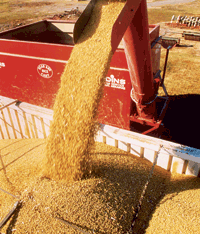Plans for GM feed imports unworkable, says NFU

EU plans to scrap the zero-tolerance policy on GM material in imported animal feed will be unworkable if recently leaked details are borne out, according to the NFU.
The proposals, under discussion in the EU Commission, will apparently allow traces of GM material in feedstuffs that have been approved in the exporting country and which are also awaiting EU approval.
The aim is to prevent a repeat of last year’s problems when supplies of US soya beans were turned away after traces of GM material were discovered.
The actual level of contamination that will be allowed remains unclear, said NFU chief science adviser Helen Ferrier.
“Versions vary from 0.1 to 0.3%. A higher figure would be better – 0.5% would reflect the transitional threshold for crops in trial, which would be more sensible.”
But her main concern was that the proposals apparently exclude food for human consumption, which would mean exporters having to adopt expensive separation processes to avoid any chance of cross-contamination.
“Exporters have already raised concerns saying that such a plan would raise insurmountable difficulties. Given that EU approvals processes include both food and feed, it’s just not appropriate.”
Agricultural Industries Confederation policy manager Charlie Battle welcomed news of the commission’s proposals.
“While we would like to have seen a larger threshold, we recognise that 0.1% is the maximum that could be achieved without changing the existing legislation, which would have resulted in further delays.
“We strongly urge the coalition government to back this proposal. This draconian zero-tolerance legislation has already cost the UK livestock industry over £200m.”
Peter Melchett, policy director at the Soil Association, branded the plan as outrageous. “To allow even 0.1% of a GM product not cleared as safe in the EU is ludicrous. What’s the point of having a scheme at all?”
He believed the proposal was intended to make it easier to import GM feed from the USA that was contaminated with unapproved traits.
“There are plenty of non-GM soya beans available in South America and the USA to fill all the EU’s needs. Animal feed companies say the proposed level is much too low to be workable, but we believe there shouldn’t be any leeway at all.”
